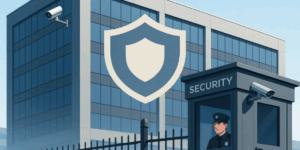In today's dynamic business environment, corporate security is essential for safeguarding assets, ensuring employee safety, and maintaining operational continuity. As threats evolve, organizations must adopt comprehensive strategies to address both physical and digital vulnerabilities.
The Importance of Corporate Security
Corporate security encompasses measures designed to protect a company's personnel, property, and information systems. This includes implementing access controls, surveillance systems, cybersecurity protocols, and emergency response plans. By proactively identifying and mitigating risks, businesses can prevent potential disruptions and financial losses.
Key Components of Effective Corporate Security
- Risk Assessment: Regular evaluations to identify potential threats and vulnerabilities within the organization.
- Physical Security Measures: Deployment of security personnel, surveillance cameras, and controlled access points to deter unauthorized entry and monitor activities.
- Cybersecurity Protocols: Implementation of firewalls, encryption, and intrusion detection systems to protect sensitive data from cyber threats.
- Employee Training: Educating staff on security policies, emergency procedures, and recognizing suspicious activities to foster a culture of vigilance.
- Incident Response Planning: Developing and rehearsing action plans to respond swiftly to security breaches or emergencies, minimizing impact.
Enhancing Corporate Security with Professional Services
Partnering with specialized security firms can provide organizations with tailored solutions to bolster their security posture. These services may include comprehensive security assessments, executive protection, and crisis management planning. By leveraging expert knowledge and resources, businesses can address specific security challenges effectively.
For instance, conducting a thorough security assessment can reveal weaknesses in existing protocols and infrastructure, allowing for targeted improvements. Executive protection services ensure the safety of key personnel, particularly in high-risk environments or during travel. Additionally, crisis management planning prepares organizations to handle unforeseen incidents with structured responses, reducing downtime and reputational damage.
Building a Resilient Security Framework
Establishing a robust corporate security framework requires continuous evaluation and adaptation. Organizations should stay informed about emerging threats and technological advancements to update their security measures accordingly. Engaging employees at all levels in security initiatives promotes a unified approach to risk management.
Regular drills and training sessions can reinforce preparedness, while feedback mechanisms allow for the refinement of security policies. By fostering an environment where security is a shared responsibility, companies can enhance their resilience against potential threats.
Corporate security is a critical aspect of modern business operations, encompassing a range of practices aimed at protecting assets, personnel, and information. Through comprehensive risk assessments, implementation of physical and cybersecurity measures, employee training, and collaboration with professional security services, organizations can build a resilient security posture. Continuous improvement and employee engagement are key to adapting to evolving threats and ensuring long-term success.



